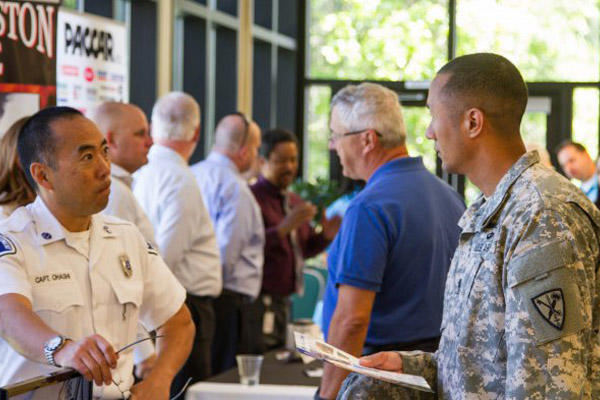I recently had the pleasure of addressing a packed room of active duty Marines at the Marine Corps Base Quantico. I talked about what they would need in transitioning to their civilian careers one day: Becoming relevant and compelling to employers, building their personal brand, articulating their value, and learning networking strategies. When I reached the networking portion of my program, I could visibly watch the color drain from their well-groomed faces.
During their time in the military, service members learn to trust and rely on each other, build strong bonds, and protect each other at any cost. The military culture promotes a "service before self" value of putting the needs of the men and women working alongside you before your own. When talking to veterans and active duty service members about civilian-style networking, many have a negative reaction, often describing networking as "sucking up," "kissing butt," or worse.
Why Networking is Important
In the civilian work environment, we know that relationships, credibility, and networking are paramount to building and sustaining a successful career. When you have a healthy network of contacts who can vouch, refer, and mentor you, your ability to attain desirable opportunities increases exponentially.
Savvy employers recognize that when their team members are involved in industry organizations, non-profits and community work, and participate in meetings, events and conferences related to their work, there is a return on that effort to the company. The company brand is elevated when employees represent themselves well and have healthy relationships in their communities. Employees at all levels of the company are encouraged to have strong and rewarding networks of contacts online and in person, which advances the employee's personal brand and reputation, and builds awareness for the company brand as well.
What Networking Means to Veterans
The veterans I've spoken with over the years say networking makes them feel:
- Like they are begging
- Cheap ("networking feels like a cheapened form of sales")
- Worried about being personally rejected
- Intimidated, as they often perceive civilians as good at networking while veterans are not
- Disingenuous -- if they have not been trained on building credibility and intentional networking skills, they believe they are supposed to act like someone else.
Veterans often see networking as a distasteful way to convince someone to like you, do business with you, or buy from you. Unless trained in authentic and effective networking skills, most veterans will turn away from the opportunity to meet strangers in business or professional settings unless mandated.
How Can You Help?
Veteran-specific onboarding processes should include a focused discussion of what networking is and how it works, inside the company and in the community, online and in person.
Start by teaching veteran employees that networking means:
- Getting to know the other person, over time, with intention
- Remaining truthful and genuine, never overselling your abilities, offer or experience
- Being other focused – asking the other person about themselves, their business and their goals
- Relating to others so as to build rapport, and eventually a win/win professional relationship
Then, expand the employee's networking skills by:
- Discussing networking in all mentoring conversations with veteran employees
- Role playing different scenarios with different target audiences
- Helping the employee develop a flexible and impactful elevator speech
- Highlighting body language tactics to build rapport
- Providing feedback on what they are doing well, and where they can improve
- Explaining that vibrant networks start small and build over time
- Having veterans on your team share examples of how they built their network and developed viable contacts
- Outlining a tangible and measurable strategy for their networking efforts.
Your veteran employees are accustomed to training and coaching – they received a lot of this in their military career. Approach the networking conversation with them in a way that emphasizes the importance of relationships, inside the company and outside, online and in person.




